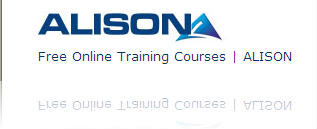 ALISON provides interactive multimedia courses for subjects as diverse as IT Literacy, English Language, Financial Literacy, Math, Business Skills and Health & Safety for Schools. It serves both the adult and second level learners.
ALISON provides interactive multimedia courses for subjects as diverse as IT Literacy, English Language, Financial Literacy, Math, Business Skills and Health & Safety for Schools. It serves both the adult and second level learners.All these courses are available for free, and are interactive; they contain audio, video, Adobe Flash, online quizzes, assessments and SCORM compliant content. After successfully completing these courses, you will be able to download your Certificate of Completion.
Since the beginning of 2007, ALISON has acquired learners in every country worldwide. It's mission is to enable anyone, anywhere to educate themselves for free via the Internet.
 An example of an ALISON course is ABC IT, which is the most popular IT skills certification. It includes comprehensive training on the Internet, key desktop applications like Word and Excel as well as the full range of practical IT skills, including touch-typing and the efficient use of Web-based e-mail. It is also prefaced by a beginner's guide to a personal computer, and so is ideal for learners who have no IT experience. For Certification, ALISON uses a highly innovative approach of Flash-Testing, where anyone, anywhere, can be challenged to take a five minute test to validate their certification attainment via ALISON.
An example of an ALISON course is ABC IT, which is the most popular IT skills certification. It includes comprehensive training on the Internet, key desktop applications like Word and Excel as well as the full range of practical IT skills, including touch-typing and the efficient use of Web-based e-mail. It is also prefaced by a beginner's guide to a personal computer, and so is ideal for learners who have no IT experience. For Certification, ALISON uses a highly innovative approach of Flash-Testing, where anyone, anywhere, can be challenged to take a five minute test to validate their certification attainment via ALISON.In this way, both training and testing are provided free of charge.
Read more...
ABOUT ALISON
ALISON provides FREE online learning via interactive multimedia for basic and essential workplace and life skills. It has registered learners in every country worldwide covering subjects such as IT Skills, Health and Safety, English Language, Psychometric tests, Financial Literacy, Financial and Health Literacy. Corporate, Human Resource, Operations, Project and Information Technology Management, Accounting, Psychology, Biology, Economics, Government Policy, English Grammar, English Literature, English Writing, General Science, Biology, Chemistry, Physics, Human Health, Mathematics, Law, Outdoor Education, Coaching, Training Theory, Adventure, Visual Communication and Design.
ALISON also provides free learner group management for trainers, teachers, tutors and HR Manager's in schools, colleges and universities. ALISON is a privately-owned social enterprise headquartered in Galway, Ireland and promoted with the assistance of over 3,000 volunteers worldwide. The mission of ALISON is to enable, anyone, anywhere, to educate themselves for free via interactive multimedia on any subject online.
ALISON stands for Advance Learning Interactive Systems Online.
For the full list of new courses, go to the website http://alison.com/course/
Source: Training Press Releases






























